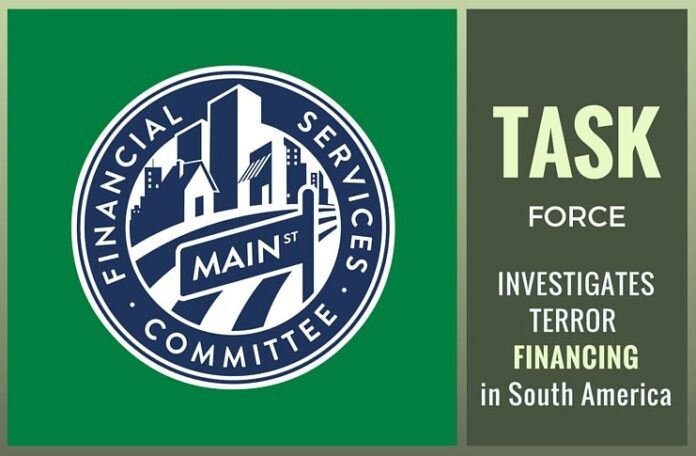
WASHINGTON
[dropcap color=”#008040″ boxed=”yes” boxed_radius=”8px” class=”” id=””]T[/dropcap]oday, the Task Force to Investigate Terrorism Financing held a hearing to examine how South American criminal enterprises fund their operations, including through illicit uses of the financial system. This includes criminal enterprises designated by the State Department as Foreign Terrorist Organizations.
Illicit financial flows in the Western Hemisphere are characterized by their links to transnational crime, trade-based money laundering, bulk cash smuggling, and corruption. According to the Treasury Department, trade-based money laundering (TBML) activity is growing in both volume and global reach, which was the focus of a February 3 hearing of the Task Force. Some international terrorist groups, including a few that operate in South America, also profit from significant criminal activity in the region. In a recent roundtable with the media, Admiral Kurt Tidd, U.S. Commander of Southern Command (SOUTHCOM), even raised concerns regarding the growth of Islamist extremism in the region, noting that the Islamic State has attracted between 100 and 150 recruits from Latin America
“During a recent bipartisan CODEL to Colombia, Panama, Paraguay, and Argentina, I was able to meet with U.S. personnel on the ground working to identify, and choke off, funding to terrorist and organized criminal groups in the area,” said Task Force Chairman Mike Fitzpatrick (R-PA). “The expert panel of witnesses we have before us today will help us continue the important investigation we started on that trip of the efforts put forth by our allies and U.S. personnel in the region to combat the threat and whether U.S. lawmakers need to provide new tools or engage the administration more effectively to use the authority and resources they already have.”
Key Takeaways from the Hearing:
-
While anti-terror finance laws and regulations put in place after 9/11 have generally done a good job of pushing a lot of illicit finance from the U.S. financial system, the terrorist threat is constantly evolving and so is terrorists’ ability to finance their operations.
-
Latin America accounts for approximately 30% of the State Department’s global list of 67 major money laundering countries, which includes the United States.
-
Both Treasury and Congress need to continually evaluate and improve our nation’s ability to starve terrorists of any financial resources they need to carry out their evil attacks.
-
Better information sharing among government agencies, between the government and financial institutions, and between banks is necessary to root out illicit finance.
Topline Quotes from Witnesses:
“Drug trafficking, trade-based money laundering and terror financing in Latin America have merged as a single threat to the national security of the United States: drug cartels, smugglers, counterfeiters, insurgent groups, and terror organizations have coalesced, sometimes against local authorities and sometimes with their active complicity and support, for their mutual benefit. The result is a toxic mix in which drug traffickers rely on terror organizations to move their merchandise to their final destinations in North America and Europe. For their part, terror organizations offer the traffickers services that generate profits to fund their own terrorist activities.” – Emanuele Ottolenghi
“Sophisticated international terrorist organizations like Hezbollah do not issue identification cards, seldom wear uniforms and most often operate in the shadows while conducting highly sophisticated transnational criminal schemes to generate the revenue required to keep their movements alive. These activities also permit Hezbollah to develop and nurture valuable associations with other terrorist, insurgent and transnational criminal organizations, as well as human and weapons trafficking groups, local indigenous organized crime groups and money laundering networks. If we do not move more aggressively to keep Hezbollah in check, the numbers of their illicit associations and the complexity of their operations will continue to grow. They will continue to evolve and become ever more dangerous.” – Michael A. Braun, Co-Founder and Managing Partner, SGI Global, LLC
“It is clear to us by now that there was a complete lack of political will to fight money laundering and terrorist financing in Argentina during the last 12 years. There was not only a lack of will to assess and understand the nature and magnitude of the money laundering, and particularly, the terrorist financing threats. There was also a clear intent to conceal them, evidenced by the interruption in the publication of official crime data and statistics that took place since 2008….As we move forward in repairing the damages left by the previous administration and start building a stronger anti-money laundering/counter terrorist financing (AML/CFT) framework, the support from the international community, and particularly our main partners, such as the United States, becomes critical.” – Mariano Federici, President of Argentina’s Financial Intelligence Unit
- Prime Minister Narendra Modi: A Gujju businessman who does not invest his precious time for a losing battle - April 13, 2024
- NIA arrests two accused Shazib and Taahaa in Bengaluru’s Rameshwaram Cafe blast case from Kolkata - April 12, 2024
- National Herald scam: Adjudicating Authority upholds Rs.752 crore assets attached by ED - April 11, 2024








